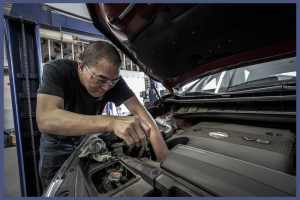Get Pre-Approval Now
- We Buy Cars!
- Click Here!
 Engine problems can lead to serious, even permanent, engine damage. If your engine is malfunctioning, your local used car dealer can fix it for you. These are some of the problems our expertly-trained technicians can repair.
Engine problems can lead to serious, even permanent, engine damage. If your engine is malfunctioning, your local used car dealer can fix it for you. These are some of the problems our expertly-trained technicians can repair.
Check Engine Light
The check engine light can be the first indication a driver receives that something is wrong with their engine. Your vehicle has a vast network of sensors, and each sensor is attached to a vital component. These sensors continually feed information to your car’s computer, which allows it to make decisions. The sensors also provide a warning of any problems with a component.
Sensors are capable of detecting even the smallest change in the behavior of their attached component, and they report this to your computer. The computer logs the information with an error code and then activates the check engine light. If this light is illuminated, we advise calling our service department ASAP so we can investigate and fix the problem.
Worn Spark Plugs
Your spark plug’s job is to ignite the compressed air-fuel mix in the cylinders. Air and fuel mix in the intake manifold and this mixture is drawn into the cylinders. The fuel-air mix is compressed in the cylinder and ignited at a precise moment. The resulting explosion causes the cylinder to open and expel the combustion remnants, and the cycle starts again.
Spark plugs gradually wear out due to age. They can also be damaged by the failure of other components, like the ignition coil or a blocked car air filter. A high fuel content in the fuel-air mix can also damage the plugs by coating them in a sticky carbon solution. Worn or damaged plugs will cause misfiring and potential damage to your engine. We can easily test the plugs and replace any worn or damaged ones.
Damaged Belt Tensioner
Several of the systems in your car, like the alternator, power steering, and AC compressor, are powered by the movement of the alternator belt. This belt connects to the crankshaft. As the crankshaft turns, the belt runs across a series of pulleys and causes them to spin. The spinning pulleys then provide power to the above systems.
The belt must be maintained at exactly the right tension. A belt that’s too loose could fall off or jam, while a belt that’s too tight could snap. The belt tensioner keeps the alternator belt at the correct tension. If it fails, you might hear banging sounds as a loose belt flops around, or your car could stop it the belt snaps. We’ll check the tensioner and replace it if it’s failed.
Don’t risk engine damage, call us today at Duncan Suzuki.



